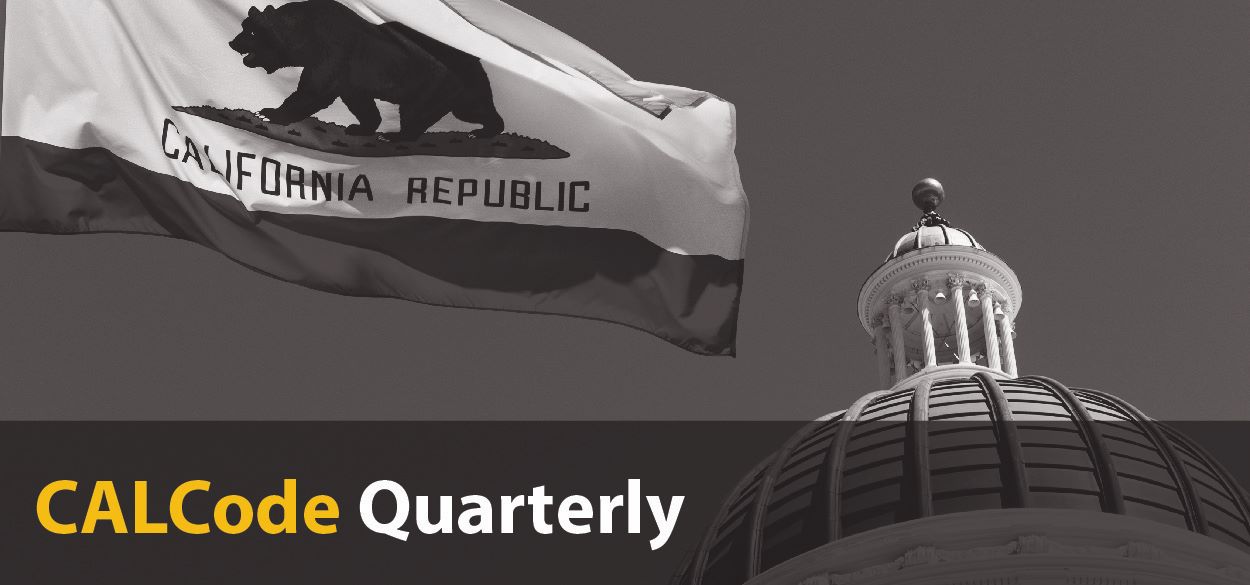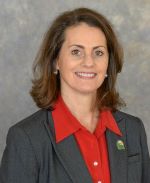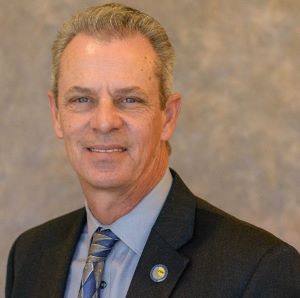CALCode Quarterly - Winter 2022


Executive Director Message
As this winter winds to a close, California Building Standards Commission (CBSC) staff is wrapping up the 2021 Triennial Code Adoption Cycle, and starting the 2022 Intervening Cycle. This is a regular occurrence about every 18 months, when the rulemaking cycles overlap and CBSC effectively administers two code adoption cycles simultaneously. The grand finale of the 2021 cycle will be the publication of the 2022 edition of the California Building Standard Code, Title 24 of the California Code of Regulations (Title 24) on July 1, 2022. The regulations in this new edition will go into effect on January 1, 2023.
The beginning of the intervening cycle will kick off with pre-cycle workshops by agencies intending to propose new or amended building standards that are complex or numerous, as required by the Administrative Procedure Act and the California Administrative Code (Part 1 of Title 24). Interested persons should sign up for the mailing lists of other code-proposing agencies to receive notice of their workshops. The contact list included at the front of every part of Title 24 (and posted on our website) outlines the general areas of authority for state agencies and provides websites and phone numbers for each.
Please read the Pre-cycle Activities feature article for more information about a CALGreen Carbon Reduction workgroup, an Electric Vehicle workgroup and other pre-cycle topics.
In other CBSC news, Deputy Executive Director Michael “Mike” Nearman retired from CBSC in early February of this year. Please see the article below for more about Mike and his career with CBSC.
I am pleased to announce the promotion of Beth Maynard to the position of Associate Construction Analyst. Beth has been with CBSC since 2019 and you can learn more about her in this newsletter’s Staff Spotlight.
CBSC collaborates with many professional organizations for education and outreach opportunities and the development of building standards. This newsletter features an article from the California Building Officials (CALBO) that provides information about their current activities.
Finally, with COVID restrictions lifting, CBSC plans to attend several upcoming events and meetings. Check out our Education and Outreach segment to see where we’ll be, and we hope to see you soon.
Feature Articles
CBSC, in conjunction with other state agencies, will convene two workgroups to develop and propose new regulations for inclusion in CALGreen (Part 11 of Title 24) in support of California’s Climate Action Plan. When proposing building standards for Title 24, the acronym used by CBSC is BSC, to distinguish between the commission that approves and adopts all California amendments in Title 24 and the commission as a proposing agency (for limited occupancies).
The two workgroups are:
-
The CALGreen Carbon Reduction Collaborative (CCRC). The CCRC will include individuals representing a cross-section of interested parties whose purpose is to ensure that BSC and the Division of the State Architect (DSA) consider a wide range of views and perspectives to develop CALGreen regulations relating to carbon reduction.
-
The CALGreen Electric Vehicle Workgroup (CEVW). BSC, DSA and the Department of Housing and Community Development will hold meetings to garner participation from interested parties and people who are affected by building standards regarding rulemakings related to electric vehicle infrastructure and charging.
The charters for these workgroups are developed to ensure a transparent, collaborative and successful process whereby appropriate regulations can be developed to meet California’s mandated goals. The activities and objectives are prescribed by legislative mandates, executive orders, or a demonstrated need identified by a state agency or proposed by stakeholders. The processes and procedures are governed by Building Standards Law and the Administrative Procedure Act. For more details about how the rulemaking process is conducted, watch CBSC’s video About the Rulemaking Process.
The workgroups are consultative, without formal decision-making authority, and members are chosen to represent the interests of their broader stakeholder group, not solely their own interests or those of any specific organization. Goals also include addressing the diverse needs of code beneficiaries and providing clarity sought by code users—the people who design, build, own, operate or regulate the built environment.
Workgroup meetings will be noticed to the public, livestreamed and recorded to allow for public participation.
CBSC intends to conduct other pre-cycle workshops to discuss possible California Plumbing Code amendments and CALGreen bird-friendly design building standards. CBSC will also participate in a workgroup convened by the Office of the State Fire Marshal to address the possible adoption of International Existing Building Code Chapters 6 through 11, and 13 to provide more design options when an existing structure is undergoing an alteration, addition or change of occupancy.

Retired Deputy Executive Director
Michael "Mike" Nearman
Mike joined the California Building Standards Commission (CBSC) in 2000 as an Architectural Associate. Eleven years later, he was named Deputy Executive Director and continued in that role until his retirement in February of 2022.
For over 20 years, Mike was intricately involved in the development of the California Building Standards Code, Title 24 of the California Code of Regulations (Title 24). During this time, he gained a wealth of experience and knowledge concerning the codes and regulatory rulemaking practices, and has guided both CBSC and other state agencies through the process for multiple code adoption cycles. In addition, Mike was present at every public CBSC meeting for every cycle since September 2011, providing guidance on points of order to commissioners and presenters, as well as monitoring the actions taken on every code proposal presented for approval and adoption.
As the Deputy Executive Director, Mike led the Title 24 development technical staff team, and would meet with state agency representatives and appointed California representatives to support CBSC’s mission and policies. In the early days of the development of the California Green Building Standards Code (CALGreen, Part 11 of Title 24), he kept a suit jacket and tie at the office in case he was urgently called to accompany CBSC’s Executive Director to the governor’s office! Associate Construction Analyst Enrique Rodriguez says, “I was fortunate to work with Mike side by side in the CALGreen code development since 2010. He was a good boss and a great mentor. He will be missed.”
One of CBSC’s principal directives is to educate the public about Title 24. Mike was one of CBSC’s main presenters at many expos, forums, business meetings and trainings, where he would generously share his expertise with design professionals, building officials, and those involved in the building trades, as well as state agency staff involved in rulemaking. His contributions to CBSC educational publications and videos were vital to their accuracy and value to the commissioners, members of the public and state agency representatives. Staff Services Manager I Katrina Benny says she is thankful to Mike “…for creating opportunities for CBSC and for being so passionate about our mission and the rulemaking process.”
Staff Services Manager I Kevin Day speaks for all of us at CBSC when he says, “Mike’s contribution to CBSC and the building standards community at large is immeasurable. He has been a great mentor and I wish him all the best in his new journey.”
The CBSC team wishes Mike a carefree and relaxing retirement spending time with his family and on the golf course.

Associate Construction Analyst Beth Maynard
The California Building Standards Commission (CBSC) congratulates Beth Maynard on her promotion to Associate Construction Analyst effective March 2. Beth joined CBSC as an Architectural Associate in May of 2019. She moved to CBSC from the Department of Housing and Community Development (HCD), where she was a District Representative in the Division of Codes and Standards. Prior to HCD, Beth worked at the City of Sacramento in the Building Department as a building inspector. Beth will continue her role administering the Title 24 code adoption process, representing CBSC at policy meetings, researching and proposing building standards, as well as researching issues related to petitions received by CBSC and drafting information bulletins.
Prior to becoming a building inspector, Beth earned an Associate of Science degree in Building Inspection Technology. Then, while working at HCD, she helped develop building standards for residential occupancies. This unique blend of familiarity with the codes makes Beth a great asset to CBSC.When asked about her favorite aspects of working with CBSC, Beth said, “Call me weird, but I find working with codes very gratifying. I used to work on the enforcement side, which I really enjoyed. Now, I love being on the development side and learning how code amendments are created and added to the codes.
For anyone interested in a career in code development, Beth recommends patience and persistence. She says, “The building code community is a great group of people!
In her spare time, Beth volunteers with Project RIDE, where she can enjoy her love of horses and give back to a deserving community of people with special needs.
Please join us in congratulating Beth on her new position with CBSC.
The Regulatory Process; the key to successful policy implementation
By Dr. Matthew Wheeler
The legislative “bill introduction” deadline has just passed. This year, February 18 marked the last day for all state legislators to propose new initiatives for the state. In a term limited environment, legislators take this opportunity to change policy seriously realizing that their time to impact policy is narrow.
For organizations like California Building Officials (CALBO), our work is cut out for us. The state affords us 30 days to review all legislative proposals, or bills, prior to the state legislature’s ability to act. In theory, this gives us all an opportunity to see what has been proposed, examine its impact upon our constituency, and prepare an appropriate response. This year is no different and CALBO has gone to work.
In the decade preceding the pandemic in an age of in-person meetings, CALBO focused our direct advocacy efforts with state legislators on a message; Do not legislate codes, regulate. This simple message was rife with value to code officials, as it was meant to be an offensive, preventative strategy against narrow and prescriptive legislation. Our efforts, as those administering the codes, was to assist in areas where we are most productive and aid with those who may have never been on the front-line of enforcement. When bills prescribe the way we, as code officials, must enact and enforce a new policy – our hands are tied. Oftentimes those on the front-line of code enforcement can find themselves at odds with the very laws they are required and seek to enforce. Strong legislation enables us, as local code officials, to work directly with the regulatory agencies on the proverbial “in’s and out’s” of code development.
We already know the good work that the CBSC completes as part of its functionality as a division of “interagency support.” Coordinating the efforts of applicable state agencies, ensuring its accuracy and compliance with existing statute are all a part of the CBSC and its charge. Code officials live by the regulatory efforts of the CBSC and the triennial and intervening code adoption cycles as they elevate public safety through the adoption of the most contemporary, technologically-advanced and streamlined codes. The proverbial “bible” that code officials follow when conducting their jurisdictional work is to follow the applicable and current editions of the California building, fire, residential, plumbing, mechanical and electrical codes (to name a few).
This year, many bills direct the California Building Standards Commission (CBSC), alongside other regulatory rulemaking state agencies, to take action in some way, shape or form under the existing code adoption and regulatory process. To say that we feel validated, is an understatement – as it will amount to stronger, holistic building and life safety provisions in the golden state. Although this is by no means an endorsement of any proposed policies, it feels refreshing to witness a demonstrated understanding on the part of the legislature that policy is best implemented through inclusive regulatory channels.
California lawmakers are progressive. They have some good ideas, and our state prides itself on being the leaders in thoughtful, socially-developed public policy. As Californians, we live by the credo that what happens in the golden state will spread throughout the nation like wildfire. With that, we still need to be mindful that a great idea is simply a notion unless it is appropriately implemented and becomes enforceable. CALBO is a partner to progressive lawmakers. More often than not when we take an Oppose position on a measure, it is due to the fact that it is not enforceable or lacks the means to implement. By directing an agency to take action on a policy, it takes the opinion out of the policy and enables the enforcement community to implement. A win-win for legislators and regulators alike.
Today, we all strive for streamlined processes and procedures. Efficiency has become a good word that is not limited to bottom-line driven businesses and the private sector. The public sector encourages holistic models that will look at all elements of a project, including legislative intent. When lawmakers come to the realization that CALBO and our code official members are partners in enforcement, not foes in policy, we have reached a new collaborative benchmark that benefits us all. 2022 is looking up, and we’ll take it.
_________________________
California Building Officials (CALBO) represents local city and county building departments throughout the entire state of California. CALBO members are primarily responsible for enforcing building code requirements in an estimated 95% of the buildings constructed in the state. Accordingly, CALBO members ensure that proper public health and structural safety requirements, codes and standards are adhered to within the built environment, protecting communities, citizens and the overall safety of the public. Dr. Matthew Wheeler has served as CALBO’s Executive Director since 2004.
Fall 2021 Poll Results
Question: How would you like to see California code changes presented - PDF or Webpage?
Most respondents wanted to be able to have a choice between looking at the code changes online or downloading a PDF. So, CBSC will develop the information in both formats for our stakeholders and interested parties. Watch for our Information Bulletin in June 2022 announcing the publication of the 2022 edition of Title 24 and how you can access information about changes specific to California.
Education and outreach
Between the last newsletter and this one, the California Building Standards Commission (CBSC) staff have been busy finalizing the adoption and approval of the 2022 edition of the California Building Standards Code, Title 24 of the California Code of Regulations (Title 24). As the publication of Title 24 on July 1 nears, we look forward to seeing you at future education and outreach events.
March 15 – The Town of Fairfax is a green champion in California! They currently adopt Tier 1 voluntary measures of the California Green Building Standards Code (CALGreen, Part 11 of Title 24) as mandatory in their town. For the 2022 edition of Title 24, the town’s sustainability committee invited Associate Construction Analyst Enrique Rodriquez to present information regarding updates to the mandatory codes and the changes to Tier 1 and Tier 2 voluntary measures. The committee’s goal is to advance sustainable building in their community by adopting more stringent green regulations. If your town, city or county is interested in learning more about CALGreen and the tiers, please let us know at cbsctraining@dgs.ca.gov.
April 19-20 – County Building Officials Association of California (CBOAC) Annual Conference. Executive Director Mia Marvelli and Associate Construction Analyst Beth Maynard will be attending the CBOAC annual conference on April 19 and 20 in Yosemite. On Wednesday, Mia will present an update on CBSC’s recent activities and plans for the upcoming Intervening Code Adoption Cycle. This will be our first in-person event in a long time, and we hope to see you there!
May 9-12 – California Building Officials (CALBO) Annual Conference. Executive Director Mia Marvelli, Associate Architect Irina Brauzman and Associate Construction Analyst Beth Maynard will be attending the CALBO annual conference on May 10-12 in Rancho Mirage. On May 11, Mia will present an update on CBSC’s recent activities and plans for the upcoming Intervening Code Adoption Cycle.
May 25 – Green Technology’s Sustainable Facilities Forum in Sacramento. Each year, Green Technology—a non-profit organization working to inform public efforts toward sustainability—hosts an event that highlights green building strategies, best practices and new technologies. With keynote speakers, educational sessions, and an expo floor featuring vendors and government booths, the forum is an excellent opportunity to learn about new developments in sustainable building. At this year’s forum, CBSC will have a booth on the expo floor, and Associate Construction Analyst Enrique Rodriquez will present an educational session about nonresidential CALGreen updates and future developments. We hope to see you there!
May 2022 – The International Code Council’s (ICC) Building Safety Month. CBSC supports ICC’s building safety month. Watch for more information on CBSC’s website this May!
